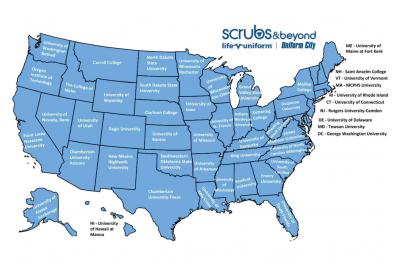
Nursing careers are limitless. According to the American Association of Colleges of Nursing, 94% of BSN graduates get job placements within four to six months of completing their programs. The rate is as high as 97% in some parts of the country. However, every great nursing career that has the potential to take you anywhere from a friendly neighborhood clinic to a top research institution starts in the same place. Great nurses are made at great nursing schools.
Choosing the right nursing school is important. In addition to deciding based on tomorrow's dream, it's important to choose a nursing school based on your needs today. The best nursing program is one that you can realistically fit into your life while getting the training, credentials, and experience that you need to thrive. There are seven significant factors to consider when looking at nursing schools. Take a look at the seven things you need to know to select the right fit.
Some Basics on How to Begin a Nursing Career
Becoming a registered nurse (RN) starts with enrolling in one of the many accredited nursing programs. Future nurses often choose schools and programs based on "how far" they want to go in their careers. The four options are:
- Associate Degree:Offered through a two-year program, an associate degree can sometimes qualify a graduate for a nursing license. However, some states require graduates to transfer their credits toward bachelor's degrees in nursing.
- Bachelor's Degree:A nurse with a Bachelor of Science in Nursing (BSN) from a four-year school can apply for a nursing license in every state.
- Master's Degree:A Master of Science in Nursing (MSN) qualifies a nurse to work in a wide variety of positions. Some nurses become nurse practitioners capable of performing many of the same duties as doctors. Others pivot toward specialties like teaching or administration.
- Doctoral Degree:Doctoral programs allow nurses to be hospital executives, policy advisors, researchers, and professors.
Any future nurse intending to pursue an advanced degree after beginning a career should focus on starting with a bachelor's degree. This will allow for a smooth transition to a master's program. Of course, an associate degree can be a very appropriate choice for someone seeking to start working as a nursing professional in the shortest amount of time possible. Some schools offer online nursing programs, which can be very helpful if you plan to work while pursuing a nursing career.
Seven Key Considerations When Choosing a Nursing Program
1. Location
The truth is that nursing degrees are intensive. Adding a long commute to classes can make completing a degree more difficult by eating into study time. This is especially true if a nursing student is attempting to juggle responsibilities at work and home while pursuing a degree.
Nurses planning to enroll on a full-time basis might focus on the opposite end of the location spectrum. Choosing a highly-rated program in another state may create a fantastic experience for these soon-to-be nurses. Of course, pursuing a bachelor's degree instead of an associate degree is recommended for nurses going out of state since associate degrees don't necessarily transfer universally across all 50 states the way that bachelor's degrees do.
2. School Ranking
Vet each nursing program that you're considering from the eyes of future employers. Graduating from a highly rated program at a top-ranked school makes a nurse more competitive in the job market. Nurses who graduate from highly rated programs also go into the job market with the competency and confidence needed to help save lives!
3. NCLEX Pass Rates
The National Council Licensure Examination (NCLEX) becomes very important as nursing students enter their academic studies. Every nurse in every state must pass the NCLEX exam to practice nursing. While students can retake the NCLEX exam, each round costs $200. Students must also wait 45 days before trying again.
4. Tuition Costs
Weighing tuition costs against financial aid and scholarships provided by each program is an excellent way to decide which nursing program is financially feasible.
It's essential to focus on nursing programs with accreditation from the Accreditation Commission for Education in Nursing, the Commission on Collegiate Nursing Education, the Council on Accreditation of Nurse Anesthesia Educational Programs, or the Accreditation Commission for Midwifery Education because financial aid typically doesn't apply for programs without at least one of these accreditations.
Nursing students should also assess student loan debt versus income potential. Nursing students pursuing advanced degrees may find that the income boost provided by pivoting to a nurse practitioner or administrative role is worth the additional debt incurred to graduate from a highly ranked program. Aspiring nurses who do not want to incur student debt may find opportunities for low tuition combined with generous financial aid from community colleges and state universities.
5. Placement Opportunities
This category requires some deep investigation on the part of an aspiring nurse. It's essential to become familiar with various schools' relationships with hospitals, medical centers, and other institutions. This can be especially important for job-placement opportunities. In some cases, colleges have "pipelines" to local hospitals and clinics for graduates. Some colleges and universities can offer their graduates access to exclusive job listings that are not advertised to the public. This is an important topic to address when speaking with an admissions counselor.
6. Nursing Specialties
While programs are pretty standard for a BSN, advanced degrees offer students opportunities to branch to highly specialized majors. For nurses, the wide range of options for career specialties includes surgical nursing, pediatric nursing, neonatal nursing, acute care, psychiatric care, emergency care, cardiovascular care, and more.
While focusing on specialties is essential for an established nurse pursuing an advanced degree, even first-time students enrolling to pursue their BSN degrees might want to consider the things offered by the schools they choose for their undergraduate studies. It's often easier to add extra credits toward a master's degree at the same school than starting from scratch at a new school.
7. Options for Clinical Rotations
It's important to ask how a program handles clinical rotations, even if the experience feels like it's in the distant future. Be sure to ask an admissions counselor about the hospitals used for the program you're considering. Scheduling is also important. Does a program offer evening and weekend clinical hours for students with full-time jobs? How many hours are required for graduation? What types of hospital units are included in clinicals?
Final Thoughts on Choosing the Right Nursing Program
A nursing program sets the foundation for a limitless nursing career. While it's always important to choose a nursing school that offers accredited nursing programs, it's also vital for a program to provide the qualities that make pursuing a nursing degree a tenable and realistic endeavor.
Scrubs & Beyond is here to help future nurses step into their careers with confidence from the first day! We've been outfitting nurses around the country in attractive, ultra-comfortable attire from the classroom to the executive board for more than 20 years! Find your style with Scrubs & Beyond today!







